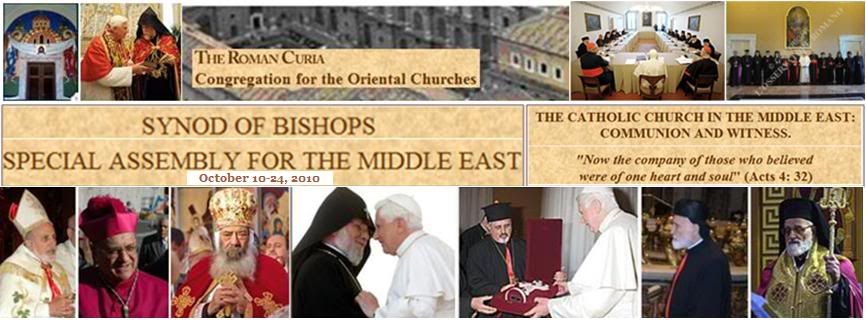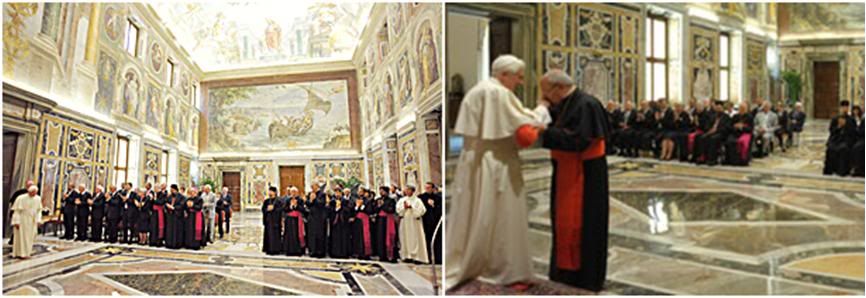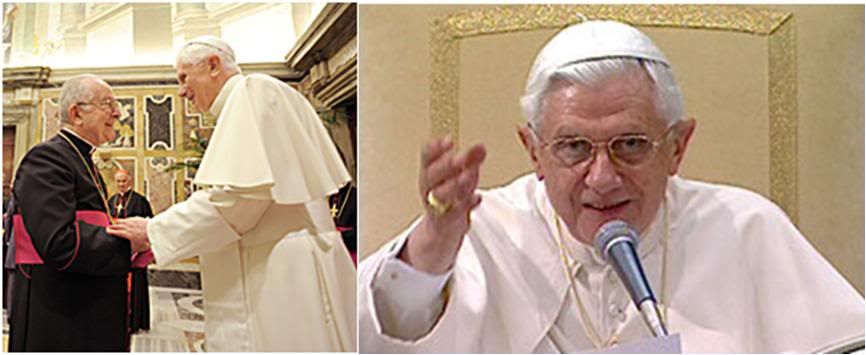 Pope pays tribute to
Pope pays tribute to
Middle East Christians


25 Jun 10 (RV) - On Friday Pope Benedict XVI received members of ROACO (Reunion of Aid Agencies for the Oriental Churches), at the end of their plenary session.
ROACO, which is under the Congregation for Oriental Churches, coordinates nearly 20 U.S. and European agencies and organizations that provide assistance to Eastern Catholic communities in Asia, Northern Africa, Eastern Europe and the Middle East.
With the coming October Synod of Bishops for the Churches in the Middle East firmly on his mind, Pope Benedict renewed his appeal for a stable peace and religious freedom in the region.
The Holy Father delivered his address in Italian, French, German and English. I have replaced Vatican Radio's translated excerpts with a translation of the full text:
Dear cardinals,
Venerated brothers in the episcopate and the priesthood,
Dear members and friends of ROACO:
I welcome you with joy for the summer session of the Riunione delle Opere in Aiuto alle Chiese Orientali (ROACO), and I give heartfelt thanks to Cardinal Leonardo Sandri, Prefect of the Congregation for Oriental Churches, for the greeting he addressed to me. I return the greeting with a prayer to the Lord, and extend it to the Archbishop Secretary, the Undersecretary and the other co-workers in the dicastery, with a cordial thought for the Pontifical Representative in Jerusalem, Israel and Palestine, for the Maronite Archbishop of Cyprus, and the Father Custodian of the Holy Land who are meeting here with representatives of international Catholic agencies and of Bethlehem University.
I express to all my gratitude and that of the Church, particularly the pastors and the Orneital-rite and Latin faithful of the terrotories under the Congregation for Eastern Churches aw well as those who have left their homelands.
He continued in French:
We all wish for the Holy Land, Iraq and the Middle East the gift of a stable peace and solid coexistence. These are born from respect for the rights of the individual, of families, of communities and peoples, going beyond all religious, cultural or social discrimination.
I entrust to God, but also to you, the appeal launched in Cyprus in behalf of the Christian Orient. As instruments of ecclesial charity, may you be able to work together even more in order to establish justice in freedom and peace.
I encourage our brothers and sisters who, in the East, share the inestimable gift of Baptism, to persevere in the faith, and, despite the numerous sacrifices, to remain there where they were born.
At the same time, I call on Oriental migrants not to forget their origins, particularly the religious. Their faithfulness and their human and Christian consistency depends on that. I wish to pay particular homage to the Christians who are suffering because of the Gospel, and I entrust them to the Lord.
I continue to count on the responsible national authorities to guarantee in a real manner - everywhere and without distinction - the public and communitarian profession of religious convictions by everyone.
Last year, on this occasion and in view of the Year for Priests, I asked for particular attention to be paid to the ministers of Christ and the Church. Abundant fruits of holiness have come forth not just for priests but for all the People of God.
Let us ask the Holy Spirit to confirm the signs of divine benevolence through the gift of vocations, of which the ecclesial community, in the West as in the East, are very much in need.
In German, he said:
I am glad to learn that the Catholic Churches in the Orient have zealously promoted the objectives of the Year for Priests and that the assistance of ROACO has helped to support them even in this area.
You have been concerned not just with the formation of candidates for Holy Orders which remains a priority, but also the needs of the clergy who are engaged in pastoral work, as, for instance, their continuing spiritual and cultural education, and help for priests who are in difficult but still fruitful conditions of illness and age.
In this way, you contribute to allow their priceless and indispensable gift of priestly service to shine forth. In antiquity, the Orient was the home of great schools of priestly spiritualty. The Church of Antioch, to cite just one example, has produced extraordinary saints: highly learned priests who did not place themselves in the foreground but rather, Christ and the Apostles. They dedicated themselves wholly to announcing the Word and the celebration of the divine mysteries. They were able to touch men in their consciences and enrich them where they could not have done so themselves with purely human means.
Dear friends, contribute above all through your engagement so that the priests of the Eastern Churches in our time can continue to reflect this spiritual heritage. This will get a great push through the network of schools and social institutions that is rightly your concern in that this will allow them a solid pastoral background.
When priests have genuine spiritual motivations in carrying out their service, they also strengthen lay people in their commitment to carry out their Christian calling alongside their temporal concerns.
In English, he said:
We now have the common task of preparing for the Special Assembly for the Middle East of the Synod of Bishops. I thank God for this initiative, which is already producing the beneficial fruits of "communion and witness" for which the synod was initially convoked.
Last year at Castel Gandolfo, I had the pleasure of announcing this Synodal Assembly during a meeting of fraternal prayer and reflection with the Patriarchs and Major Archbishops of the Eastern Churches.
During my recent visit to Cyprus, which I recall with much gratitude to God and to those who welcomed me, I consigned the Instrumentum Laboris of this Special Assembly to representatives of the Episcopate of the Middle East.
I am pleased at the broad cooperation provided thus far by the Eastern Churches and for the work which, from the beginning, R.O.A.C.O. has done, and continues to do for this historical event.
This joint effort will have fruitful results because of the presence of some of your representatives at this episcopal gathering and your ongoing relationship with the Congregation for the Eastern Churches.
He concluded in Italian:
Dear friends, I ask you to contribute with your work to keep alive 'the hope that does not disappoint' among the Christians of the Orient (Rm 5,5; cfr Instrumentum laboris, Conclusioni).
In the 'little flock' (Lk 12, 32) that they constitute, already the future of God is operative, and the 'narrow way' that they are going through is described in the Gospel as 'the way to life' (Mt 7,13-14). We must always be at their side!
Confident in the intercession of the Most Blessed Mother of God and of the holy Apostles Peter and Paul, I entrust to the Lord the benefactors, friends and co-workers, living and deceased, who have been linked in various ways to ROACO, with a particular thought for Mons. (Luigi) Padovese, who died recently, while I impart to each of you, your member organizations, and the supporters of international agencies, as well as all the beloved Eastern Catholic Churches, a comforting Apostilic Blessing.
 No glory for little-known agency
No glory for little-known agency
that funds the Eastern churches
By Carol Glatz

VATICAN CITY, June 25 (CNS) -- When the Vatican agency that coordinates funding to Eastern Catholic churches -- more often called by its Italian acronym, ROACO -- hired a Belgian priest to head its office, the first thing he said was "What is ROACO?"
Father Leo Lemmens said that when he was asked earlier this year to be the organization's secretary, he never had been aware of its existence.
Hardly a household name, ROACO is much like the backstage manager of a big Broadway show: far from the limelight, ROACO coordinates the roles of numerous Catholic aid agencies on the world stage and gets little glory when things go without a hitch.
Created by the Vatican's Congregation for Eastern Churches, ROACO coordinates nearly 20 U.S. and European agencies and organizations that provide assistance to Eastern Catholic communities in Asia, Northern Africa, Eastern Europe and the Middle East.
Coordinating the vast amounts of aid and the projects to be funded is key if the church and its donors want to avoid doubling efforts.
Such was the case in Iraq.
Donor agencies last year were eager to contribute humanitarian aid to the country. But ROACO told members that the Caritas Internationalis network was successfully providing the needed emergency assistance.
Instead, further donor help was needed in providing pastoral care to help strengthen the local churches in Iraq especially after several church buildings had been the targets of bombings in 2004.
ROACO also acts as sort of clearinghouse, taking in requests for aid and support from the Eastern churches all over the world. Eastern Catholic churches are often a minority in overwhelmingly Muslim or Orthodox Christian nations and are located sometimes in very poor countries.
At its annual meeting June 20-24 at the Vatican, ROACO alerted its members to the urgent requests for help coming in from Eritrea -- a country on the horn of Africa.
"The institutions of the Catholic Church there: the charity houses, the schools, hospitals, and clinics are risking collapse" if they do not receive needed aid, Father Lemmens told Catholic News Service.
Eritrea is "the fifth poorest country in the world and yet it is among the five countries of the world receiving the least help," he said.
Though funding remains "a huge problem," Father Lemmens said ROACO helped assign which member donor agencies would take on projects there that needed assistance.
ROACO also acts as a bridge linking the Holy See and Christians of the Latin tradition to those of the Eastern Catholic churches. The Eastern churches have their own distinctive liturgical and legal systems, but enjoy the same dignity, rights, and obligations as members of the Latin rite.
In his June 23 address to ROACO members, Pope Benedict XVI praised the organization for its work in helping "brothers and sisters in difficulty" and in "making visible the charity that binds Christians" of the Latin and Eastern traditions.
"To strengthen such ties is to offer a very precious service to the universal church," he said.
Moreover, in a world in which individualism seems to reign, the pope said Christians need to show "solidarity that crosses all frontiers."
Though ROACO addresses the needs of the Eastern churches across three continents, it also comes to the aid of the Latin-rite communities in the Middle East, particularly the Holy Land.
In order to better assess how they can help the Christian communities there, ROACO invited Archbishop Antonio Franco, the Vatican's representative to Israel and the Palestinian territories, and Franciscan Father Pierbattista Pizzaballa, custodian of the Holy Land, to tell donor agencies about the current situation.
Father Pizzaballa told CNS that "unfortunately the political and social situation remains unstable for Christians" with many continuing to emigrate abroad.
Pope Benedict said there have been "some positive signs" seen recently that have strengthened "our hope that the day of reconciliation" between Israelis and Palestinians "will not be long in coming."
Father Pizzaballa, however, said Israel's continued construction of a security barrier was a symbolic sign of stalemate.
"The wall is a strong, visible reality that is a symbol of the actual situation (in the Holy Land) of no dialogue between the parties," Father Pizzaballa said.
He urged ROACO members to keep investing in schools and training teachers "because the future for Christian communities passes through the schools."
He also said the number of foreign tourists coming to the Holy Land on pilgrimage was on the rise. He said the visits not only help stoke the local economy, they also give a "human and psychological" boost to Christians, Jews and Muslims.
"Because if they see the city is full of life, this helps" bring a greater sense of normalcy to the lives of local residents, he said.

[Modificato da TERESA BENEDETTA 27/06/2010 15:14]